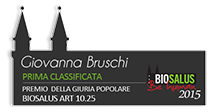FRANCO BOZZI – 4 January 1998
IN SEARCH OF LOST PAGES
Several years ago, when I was little more than a boy, and seized by a desire to open up to every cultural suggestion, I read just about everything avidly and indiscriminately (as I still do now, nurtured by that experience, while expecting my troubled teenagers to follow suit). At one point I came across a book by Albert Schweitzer, The Great Thinkers of India. At the time I attended the circle of Aldo Capitini, and I was therefore interested in religious and philosophical themes, which provided the object of discussion for our Sunday afternoons. The theories advanced by that extravagant character, a doctor fighting leprosy in black Africa and an indisputable virtuoso organ interpreter of Bach’s music, struck me immediately for his incomparable simplicity. Western civilization – the author stated in a summary – endorses life and the world, therefore it has a positive attitude towards work and history, and believes in the ability of reason to guide the course of events, entrusting philosophy with a major ground-breaking task. On the contrary, eastern civilization renounces life and the world, with a negative attitude that advocates distrust for amelioration, seeks solitude and contemplation, and dissolves the individual soul, and its mystical identity, into the universal soul. Pursuing my intellectual wanderings, I do not deny to have discovered elements that could support such a clear and linear vision. In spite of this, today I would no longer subscribe to such assertions:
The world seems to me much more complicated than the one described by the eclectic wizard of Lambarenè. If, for example, it is true that Indian thought originates from the mystic-religious texts of the Upanishads, we should not ignore that it also expresses concepts of ethics, aesthetics, politics, as well as a philosophy of science. Likewise, if the core of rationalistic-Socratic imprint of European thought seems dominant, this should not lead us to disregard the theosophical and sapiential variations that happens to be abundant, nor let us shed a negative light on those western philosophers who, like Schopenhauer, sought the liberation from pain in ascetism and the remedy for the unbearable weight of life in ecstasy. Rationality and mysticism then become no longer two opposing objectives, but a single one that can be achieved only by using an instrument capable of going beyond the phenomenal semblance to grasp the universality of the idea: and to reach such a goal I would not know think of anything better than art.This premise was necessary to understand an artist such as Giovanna Bruschi, and to try to provide an insight to her fertile production. Giovanna starts from a calligraphic representation of reality, so to speak; following the lessons of the classic authors from our Renaissance (just think about the great care that Pinturicchio reserves for the smallest detail, either for a blade of grass or a brick, in its altarpieces), she anatomizes, vivisects and reproduces her subjects; every leaf and every fruit of the earth is shown to us in minute details (this is her legacy to Father Diego Donati), with all the veins, nerves and folds that can be detected – as in a magic moment – space and time.





